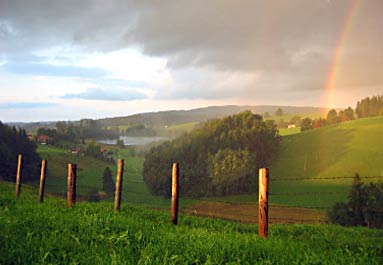This original column is provided free for one-time use with author credit at the end. It may be used for background with author credit. Copyright applies.
#153 FOR IMMEDIATE RELEASE: September 23, 2010
Farm fixes require thought and strategic dawdling
By Curtis Seltzer
BLUE GRASS, Va.—Our pastures are browning; they should be greening. When I walk the fields, the dry forage crackles. Grass like this has “no strength in it,” my neighbors say—just something for “the brutes to chew.” The steers look at me like I’m Scrooge, withholding food to be mean.
The maples want out of the stress. They’re shutting down and turning before their time.
They show bright when they gasp for water.
The pond is down. The springs are weak; some have stopped.
We haven’t had a respectable rain for four weeks, pushing five. Everyone’s testy.
Septembers are usually wet. They kick up the pastures for one last weight-gaining splurge. A dry spell like this is expected in August, but last month we had above-average rain. Things got turned around somehow, and we counted a wet September before it rained.
When friends visited for a weekend recently, we used water faster than the spring filled the holding tank. By Sunday noon, we were stirring the bottom sludge.
Molly, our resident first-string journalist, scooped the competition, reporting that “my water is coming out brown.” My wife, Melissa, looked at me expectantly.
“No one use the water for a while,” I said. “Let the tank fill up.”
“We have guests,” Melissa said, looking at me expectantly.
“Patience,” I said. “The spring’s running slowly because we haven’t had rain.”
“We have GUESTS,” Melissa said, looking at me expectantly.
“I did not cause the water shortage.”
“Always blaming others.”
“What exactly do you want me to do? Tilt the world up, so that water runs into our tank?”
“I expect you to fix it.”
Sometimes there is no fix, no something that can be done to put things right. Sometimes the fix is too expensive, or it makes other things worse.
Now that I’m almost 65, I find that I increasingly accept a category of problems, issues and conditions that human effort is not likely to solve, or solve very well, or for very long.
I continue to think we should try to solve problems that require solutions and appear solvable—like how we educate our children, lowering the numbers of Americans who are impoverished; reducing our national indebtedness; figuring out a better way to tax ourselves; establishing some measure of control over the cost of health care; and so on.
But I’m not optimistic that core solutions are available which solve the original problem without creating equally vexing problems of their own.
By the way. I’m currently working on the solution to greed. Send me a SASE with $100 enclosed, and I will respond when the answer comes to me. But wait! For $200, I’ll send you the answer for eternal life and autographed plans for a perpetual-motion machine—at no extra charge.
Living on and working land provides daily opportunities for grouping problems into appropriate categories—solvable, unsolvable, solvable but not worth doing and maybes.
As I’ve gotten older, I spend more and more time in expanding the number of problems assigned to the last three categories and less and less in actual solving and fixing. This, I think, reflects the wisdom of age. Melissa says it’s “just your basic sloth.”
Melissa thinks she is on to me. She says I should “just get on the stick” and start fixing everything from regional drought to the leaky toilet flapper in our guest bathroom.
I am flattered by her confidence that I am the solution to all problems, great and small. Nonetheless, I keep reminding her that the time I devote to concept development and pre-planning are necessary precursors to fixing anything.
She replies that I’m just “a big, ol’ lazy bum-ola.”
I’ve considered three solutions to this problem (which may or may not be solvable).
The first is to hire a full-time farm hand who will fix everything Melissa finds wrong with the world and our small part of it. Applications are being received, but I’m not optimistic.
Some guy named Gates from the West Coast has expressed interest, but his resume is a little thin when it comes to flappers and gutters. He keeps writing that we have a software problem that he’s sure he can solve with a patch…or a large check.
The other candidate graduated Harvard last year and says he’s “looking to connect organically with The Earth in all of its dimensions.” He says he wears “nothing but natural fibers, or nothing at all.”
The second solution is to recruit a traditional husband. This may present a few relationship issues since a traditional husband requires a traditional wife, and neither Melissa nor I fit the bill…for different reasons.
The third solution is to deny problems are problems. If a problem is not a problem, it requires no solution by definition.
But what happens when a problem you’ve defined as not a problem turns out to be a problem?
Easy. By then, somebody else should own it, and, therefore, it’s not your problem.
I wrestle large questions down here in Blue Grass, and I’m not ashamed to say I usually tap out.
If I tilt the world, we will have more water. If I fix the flapper, we will use less.
Fix supply or fix demand? Fix both? Choices like these require unhurried deliberation.
Patience, Melissa. Patience. The bad flapper is good for another year or two, at least. And, by then, I’m sure it will have rained.
Am I good, or what?
Curtis Seltzer is a land consultant who works with buyers and helps sellers with marketing plans. He is author of How To Be a DIRT-SMART Buyer of Country Property at www.curtis-seltzer.com where his weekly columns are posted. He also writes for www.landthink.com.
Contact: Curtis Seltzer, Ph.D.
Land Consultant
1467 Wimer Mountain Road
Blue Grass, VA 24413-2307
540-474-3297
curtisseltzer@htcnet.org
www.curtis-seltzer.com
This original column is provided free for one-time use with author credit at the end. It may be used for background with author credit. Copyright applies.
|









